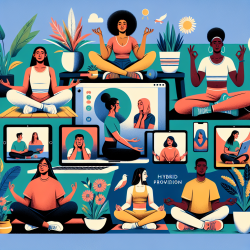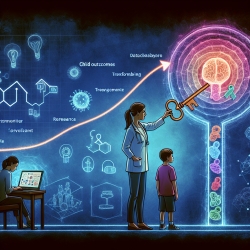As a practitioner dedicated to improving mental health services for young people, it’s essential to stay informed about the latest research and strategies. The study titled Experiences of Remote Provision across a Voluntary Sector Organisation Providing Mental Health and Wellbeing Services for Young People offers valuable insights that can help enhance your remote service offerings. Here, we’ll explore key findings and actionable strategies to improve your practice.
1. Embrace Hybrid Provision
One of the study’s primary outcomes is the importance of offering a hybrid model of service delivery. This approach combines both remote and face-to-face sessions, providing young people with the flexibility to choose the format that best suits their needs. By implementing a hybrid model, you can:
- Accommodate those who prefer the convenience and comfort of remote sessions.
- Ensure that those who benefit more from in-person interactions have that option available.
- Maintain continuity of care for young people who may be traveling or living in different locations.
2. Enhance Accessibility
Remote provision has been shown to improve accessibility for many young people, particularly those who face barriers to attending in-person sessions. To further enhance accessibility, consider:
- Ensuring that all young people have access to the necessary technology and a private space for remote sessions.
- Offering flexible scheduling to accommodate different time zones and personal commitments.
- Providing training for young people and their families on how to use remote therapy platforms effectively.
3. Build Strong Therapeutic Relationships
While building therapeutic relationships remotely can be challenging, it is possible with the right strategies. The study highlights the importance of:
- Using visual cues from the young person’s environment to build rapport and connect on a personal level.
- Balancing power dynamics by making the young person feel comfortable and equal during sessions.
- Spending additional time on rapport-building activities to establish trust and comfort.
4. Utilize Interactive Tools
Interactive tools can make remote sessions more engaging and effective. The study suggests incorporating tools like Kahoot (a game-based platform) to create a more interactive and enjoyable experience for young people. These tools can help:
- Facilitate group activities and discussions.
- Keep young people engaged and motivated during sessions.
- Provide a fun and dynamic way to deliver therapeutic content.
5. Address Practical Issues
Remote provision is not without its challenges. The study identifies common issues such as connectivity problems and lack of access to technology. To mitigate these issues, consider:
- Providing resources or support for young people to access reliable internet and necessary devices.
- Offering alternative ways to participate in sessions, such as phone calls or text-based communication, for those who face technical difficulties.
- Regularly checking in with young people to ensure they have what they need to participate fully in remote sessions.
Conclusion
Implementing these strategies can significantly enhance the effectiveness of your remote mental health services for young people. By embracing a hybrid model, enhancing accessibility, building strong therapeutic relationships, utilizing interactive tools, and addressing practical issues, you can provide high-quality, flexible, and inclusive care.
To read the original research paper, please follow this link: Experiences of Remote Provision across a Voluntary Sector Organisation Providing Mental Health and Wellbeing Services for Young People.










